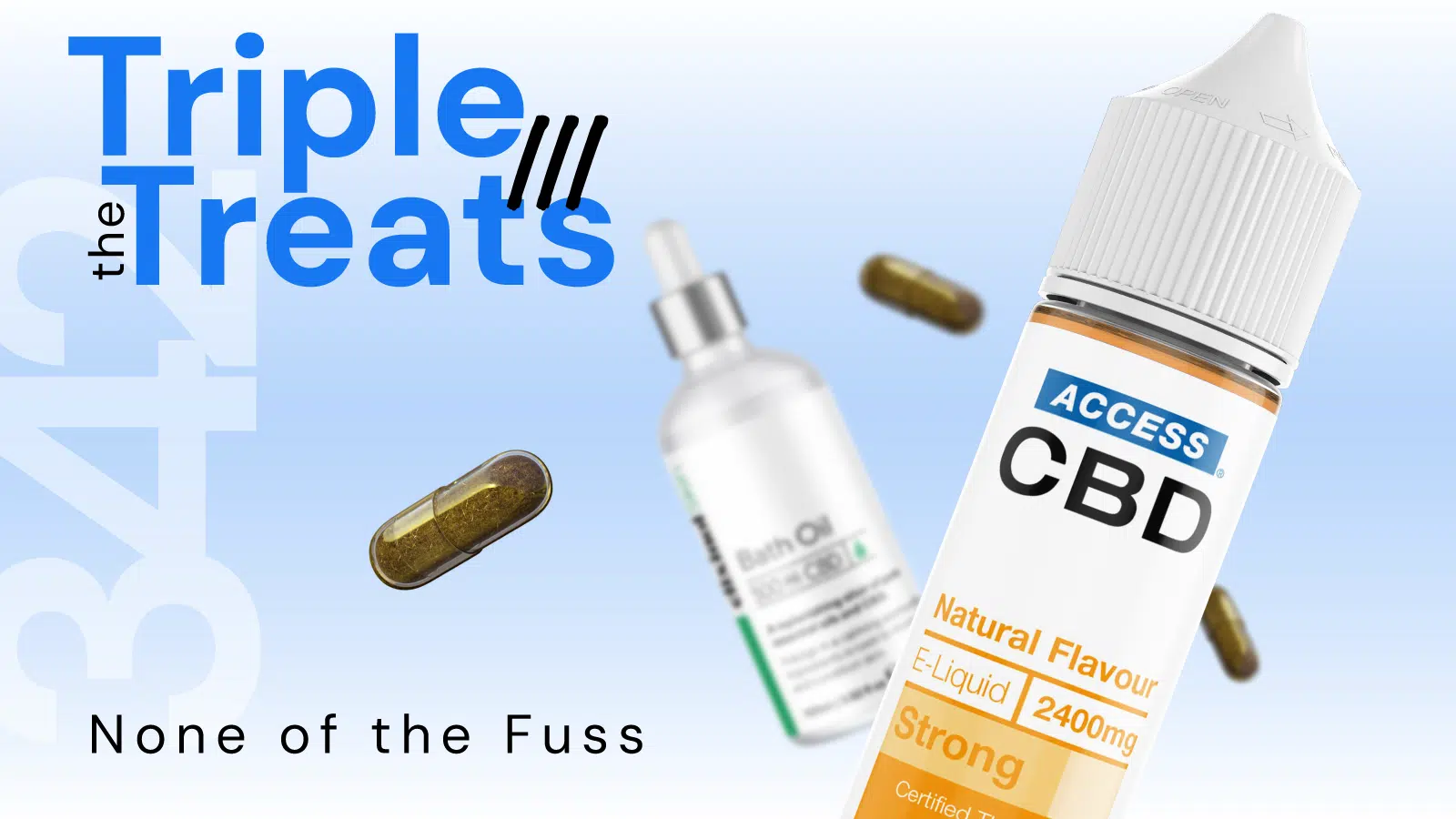Do CBD Capsules Expire and Lose Their Efficacy Over Time?

- Blog
- Last Modified: July 3, 2024
CBD capsules are a simple and convenient way to consume CBD, making them a favourite choice for those seeking an alternative to traditional medication. However, a crucial question many users ask is, “Do CBD capsules expire?”
Understanding the shelf life of CBD capsules is essential to ensure you get the maximum benefits from your supplement.
Understanding CBD Capsules
CBD capsules are a form of supplement made up of cannabidiol oil. CBD, a naturally occurring compound in the hemp plant, is renowned for its numerous health benefits.
These capsules come in pre-measured doses, making it simple to control your CBD intake.
CBD is known for its healing properties, which include relief from pain, anxiety, stress, and improvements in sleep quality. Because of their simplicity, discretion, and ease of use, CBD capsules have become a popular method of consuming CBD.
They are available in various dosages, allowing you to easily monitor your intake.
Do CBD Capsules Expire?
Like all supplements, CBD capsules do have an expiration date. Over time, they can lose their potency and effectiveness.
To ensure you get the maximum benefit from your CBD capsules, always check the expiration date before consumption. Proper storage is also essential—keep your CBD capsules in a cool, dry place, away from heat and direct sunlight, to prevent them from degrading.
By understanding the shelf life and proper storage of CBD capsules, you can ensure you are consuming a product that maintains its efficacy over time.
How CBD Capsules Work in the Body
CBD capsules work within the body through interactions with the endocannabinoid systems (ECS). It is the ECS is a complicated system of enzymes and receptors that aid in regulating different bodily functions, such as inflammation, pain, and mood. CBD works through the ECS via binding with its receptors which could help ease anxiety, pain, inflammation and stress.
CBD capsules function by interfacing with the endocannabinoid sytem (ECS) within the body. It is the ECS is a complicated system of enzymes and receptors that aid in regulating many bodily functions, such as the mood, inflammation, pain appetite, and sleep. The ECS is accountable for maintaining the body’s internal balance or homeostasis.
CBD is involved in the ECS through binding to receptors that are known by the names CB1 as well as CB2 receptors. When CBD is able to bind to the receptors it could assist in controlling different bodily functions, like reducing pain or inflammation, encouraging relaxation, and enhancing sleep.
CBD capsules affect other receptors within the body, including vanilloid and serotonin receptors, which can be a contributing factor to their health benefits. CBD capsules are now an option of choice to those who are looking for an effective method to boost their wellness and health. With the high-quality products offered by Access CBD, you can be assured that you’re getting an effective and safe product that will work with your body to ensure the best health possible.

Benefits of Using CBD Capsules
CBD capsules have a number of potential benefits, including:
- Pain relief: CBD capsules may help reduce pain and inflammation in the body, making them a popular choice for those with chronic pain conditions.
- Anxiety and stress relief: CBD capsules may help reduce anxiety and stress, making them a popular choice for those with anxiety disorders or high levels of stress.
- Sleep improvement: CBD capsules may help improve sleep quality, making them a popular choice for those with sleep disorders or difficulty sleeping.
- Convenience: CBD capsules are easy to take, discreet, and convenient, making them a popular choice for those on the go.
In addition to pain relief, anxiety and stress relief, and sleep improvement, CBD capsules have other potential benefits as well. For example, CBD capsules may help improve skin health, reduce seizures in those with epilepsy, and even have anticancer properties. CBD capsules are also a natural remedy, making them a popular choice for those who prefer to use natural remedies instead of traditional medicine.
CBD capsules are also a convenient and easy way to consume CBD. They come in pre-measured doses, making it easy to know exactly how much CBD you’re consuming. CBD capsules are also discreet, making them a popular choice for those who want to use CBD without drawing attention to themselves. And because they are easy to take, CBD capsules are a popular choice for those on the go who want to incorporate CBD into their daily routine.
Whether you’re looking for pain relief, anxiety and stress relief, sleep improvement, or other potential benefits, CBD capsules are a convenient and effective way to consume CBD. And with high-quality products from ACCESS CBD®, you can be confident that you’re getting a quality product that will maintain its efficacy over time.
Does CBD Capsules Expire?
Similar to other supplements like any other supplement, CBD capsules will expire after a certain period of time. The expiration date for CBD capsules is based on several aspects, such as the quality that the capsules are made of, conditions of storage, as well as the manufacturing date. It is important to verify when the date expires for CBD capsules prior to taking capsules that have expired, since they might not be efficient and may even cause harm.
Factors That Affect the Expiration of CBD Capsules
The expiration date of CBD capsules is contingent on a variety of variables which include:
- Qualitative quality of the product
Premium CBD capsules could last longer than cheaper products. - Conditions of storage:
CBD capsules must be kept in a dry, cool area, far from the sun’s heat and direct sunlight to ensure that they do not degrade. - Manufacturing date:
CBD capsules might have a shorter shelf time when they were produced some time ago.
Shelf Life of CBD Capsules and When They Expire
The shelf duration of CBD capsules is contingent upon the grade of product as well as the conditions of storage. In general, CBD capsules last between 6 months and 2 years, based of the maker. It is essential to know the expiration dates of CBD capsules prior to consuming the capsules, as they might not be efficient or even harmful.
Does CBD Capsules Expire and Decrease Over Time?
The effectiveness of CBD capsules could diminish over time, however it’s dependent on a range of variables. The effectiveness of CBD capsules is contingent on its quality, its conditions of storage, as well as the date of manufacture. In the event that CBD capsules are kept in a dry, cool area and aren’t expired, they will keep their effectiveness.
Factors That Affect the Efficacy of CBD Capsules Over Time
The effectiveness of CBD capsules over time is contingent on many variables, including:
- Qualitativeness of the product Quality of the product: Premium CBD capsules could keep their effectiveness longer than lower-quality ones.
- Conditions for storage: CBD capsules need to be kept in a dry, cool area, far from hot and direct sunlight, to avoid degradation.
- Date of manufacturing: CBD capsules may lose their effectiveness faster in the event that they were produced in the past.
Studies on the Efficacy of Expired CBD Capsules
There aren’t many research studies regarding the efficacy the time that CBD capsules end expiration. However studies have found expiration dates for CBD products aren’t as effective as new ones. It is essential to determine the expiration dates of CBD capsules prior to consuming the capsules, because expired ones might not be as effective or even harmful.

Why ACCESS CBD® is the Best Company to Buy CBD Capsules from
ACCESS CBD® is a reputable company that offers high-quality CBD capsules. Their capsules are made from pure, organic hemp and are third-party tested for purity and potency. ACCESS CBD® is committed to sustainability and ethical practices, and they offer a variety of products to suit your individual needs and preferences. Whether you’re looking for pain relief, anxiety and stress relief, or sleep improvement, ACCESS CBD® has the right product for you.
Conclusion
CBD capsules can be a convenient and effective way to consume CBD. However, it’s important to know if CBD capsules expire and lose their efficacy over time. The expiration of the CBD quality of the product, storage conditions, and manufacturing date can all affect the expiration and efficacy of CBD capsules. It’s important to check the expiration date before consuming CBD capsules to ensure they are still effective. ACCESS CBD® offers high-quality CBD capsules that are third-party tested for purity and potency, and they are committed to sustainability and ethical practices.
choosing ACCESS CBD®, you can be confident that you’re getting a quality product that will maintain its efficacy over time. Whether you’re health-conscious, research-focused, convenience-oriented, brand loyal, or interested in natural remedies, ACCESS CBD® has the right product for you. With their commitment to customer satisfaction, ACCESS CBD® is the best company to buy CBD oil products and CBD capsules from.
References
- Barry, C. (2022) FDA Approve Trial into CBD Capsules as a Therapeutic Option for Opioid Addiction [Online]. Cannabis Health News. Available at: https://cannabishealthnews.co.uk/2022/01/10/fda-approve-trial-into-cbd-capsules-as-a-therapeutic-option-for-opioid-addiction-industry21/ (Accessed: 13 October 2023).
- Peter (no date) UK CBD Consumption To Switch From Oils To Capsules – As New Research Estimates Market Value At £690m [Online]. Business of Cannabis. Available at: https://businessofcannabis.com/uk-cbd-consumption-to-switch-from-oils-to-capsules-as-new-research-estimates-market-value-at-690m/ (Accessed: 13 October 2023).





